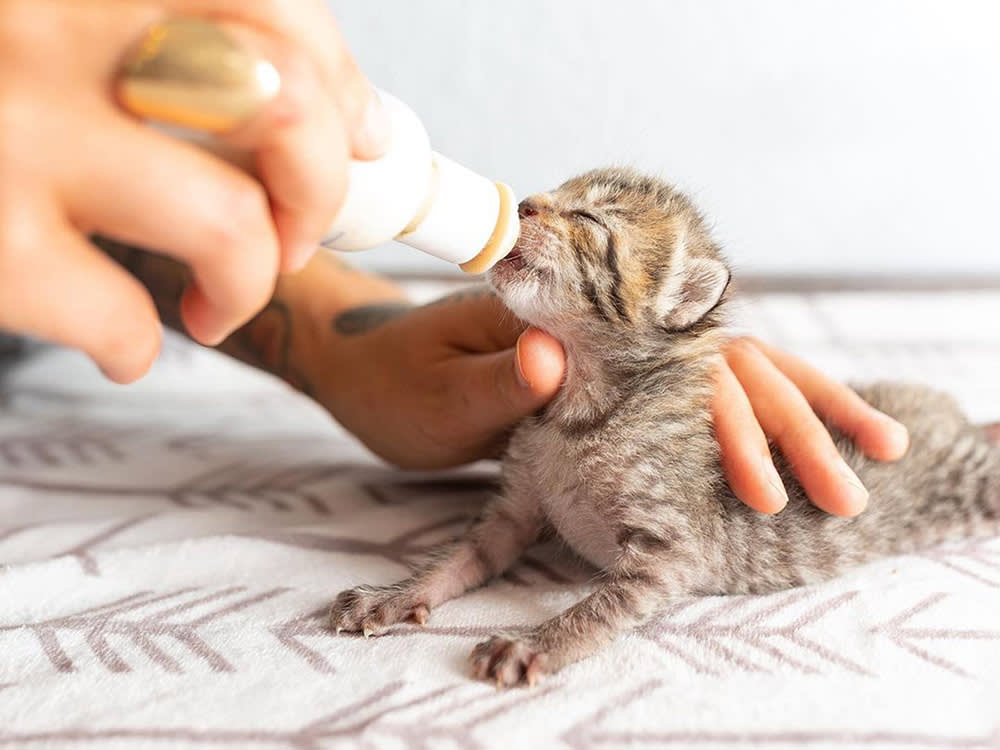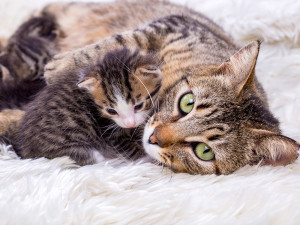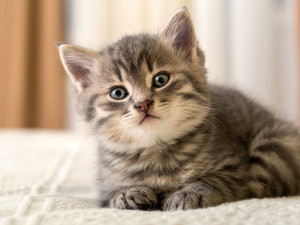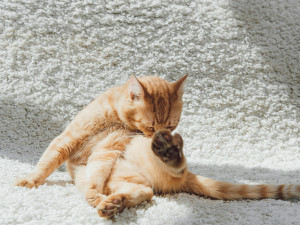RSPCA Urges Pet Parents to Neuter Cats Ahead of Kitten Season
The charity is expecting an influx of kittens this summer
As the warmer months approach, so does the anticipation of ‘kitten season’ – a period when shelters brace themselves for an influx of adorable but vulnerable feline babies and pregnant cats. The annual surge in kitten births poses significant challenges for animal welfare organisations such as the Royal Society for the Prevention of Cruelty to Animals (RSPCAopens in new tab). With the rising numbers of homeless kittens every year, the charity is urging pet parents to take proactive steps to prevent unplanned litters by neutering their cats this summer.
The RSPCA says 7,500 cats were reported as abandoned last year, and the charity received over 140,000 reports about cats to its cruelty line in the past three years, with over half of those calls coming in during kitten season alone. It’s not just kittens that are given up to rescue organisations, more and more pet parents are struggling to cope with their pregnant cats, too.
With households across the country still facing a cost of living crisis, the RSPCA believes it will start to see more cats being abandoned than ever before; the charity is urging cat parents to speak to their vets about neutering “as soon as possible” and to keep any unneutered cats indoors with “plenty to entertain them until they can be spayed”, to try to reduce the incidence of unwanted litters this summer.
“Kitten season is typically the time of year when most kittens are born and as a charity we see an influx of cats coming into our care as a result,” says Alice Potter, cat welfare expert at the RSPCA. “With the cost of living crisis putting an extra strain on people’s finances, we’re concerned that we may see more cats than ever in need of help at a time when our centres are already full-to-bursting.”
“We’d urge owners to please neuter your cats from four months old to prevent them from having unexpected and unwanted litters of kittens,” says Alice. “We know kittens may look cute but the reality is that they require a lot of care, time and money, which many people may struggle to provide and sadly means they are often abandoned or given up.”
The RSPCA is urging pet parents to take proactive measures by neutering their cats. We delve into what exactly kitten season entails and what steps we can take to ensure the well-being of our feline companions.
What is kitten season?
Kitten season refers to the time of year when cats, known for their prolific breeding capabilities, reproduce at an accelerated rate due to the longer daylight hours and warmer temperatures of spring and summer. This phenomenon typically spans from early spring to late autumn, peaking in the warmer months.
What happens during kitten season?
During kitten season, animal shelters and rescue organisations become inundated with pregnant cats, nursing mothers and orphaned kittens in need of care. The influx of kittens places immense strain on resources, with shelters often struggling to accommodate the sheer volume of incoming felines. This surge in population exacerbates issues such as overcrowding, limited space and already stretched budgets.
When is kitten season?
Kitten season varies slightly depending on geographical location and climate, but it generally occurs from late spring through early autumn. In the United Kingdom, kitten season typically kicks off in spring, around March or April, and reaches its peak during the summer months, lasting until early autumn.
The timeframe aligns with the breeding cycle of cats, as the warmer weather provides optimal conditions for mating and birthing. Consequently, shelters brace themselves for a surge in admissions during this period, preparing to provide essential care and find loving homes for the influx of kittens.
What can I do to help during kitten season?
Neuter. Your. Cat.
The routine procedure can vary in cost depending on where you are based and your particular vet, but you can expect to pay £50–100 for spaying a female, (castrating a male cat is around £40–80) according to Compare the Marketopens in new tab data. Organisations such as the Blue Crossopens in new tab and Cat’s Protectionopens in new tab offer means-tested financial assistance for neutering and microchipping cats, but it’s also worth doing some research to find the best price for you. Financial assistance is also available through the RSPCAopens in new tab.
“We need as many people as possible to join us to build a better world for every kind of animal and this is why we’re urging the public to take some simple steps to help us deal with the influx of cats in need this kitten season,” says Alice. The RSPCA has issued important advice to members of the public this kitten season:
If your cat is unneutered please make a vet appointment for them to be neutered as soon as possible to reduce the number of unwanted kittens being born.
If you find an abandoned cat or kitten, please take them to a vet immediately.
If you suspect a cat or kitten has been abandoned in a property, please contact the RSPCA to report this on 0300 1234 999.
The RSPCA is urging pet parents to prioritise neutering as a responsible measure to address the challenges of kitten season. More than just preventing an influx of kittens during the warmer months, the simple procedure can have multiple crucial benefits for your cat:
Preventing unplanned pregnancies: neutering, also known as spaying for females and castration for males, eliminates the risk of unplanned pregnancies. By spaying female cats before their first heat cycle, pet parents can prevent litters of kittens from being born.
Promoting health: neutering offers health benefits beyond pregnancy prevention. It reduces the risk of certain cancers and eliminates the urge to roam, lowering the chances of cats getting into fights or accidents.
Managing cat overpopulation: the main driver of kitten season is cat overpopulation. By neutering cats, it helps to curb the cycle of unwanted litters and reduce the strain on shelters and rescue organisations.
Responsible pet parenting: neutering is a cornerstone of responsible pet parenting. It not only benefits individual cats but also contributes to the welfare of the feline population as a whole.






